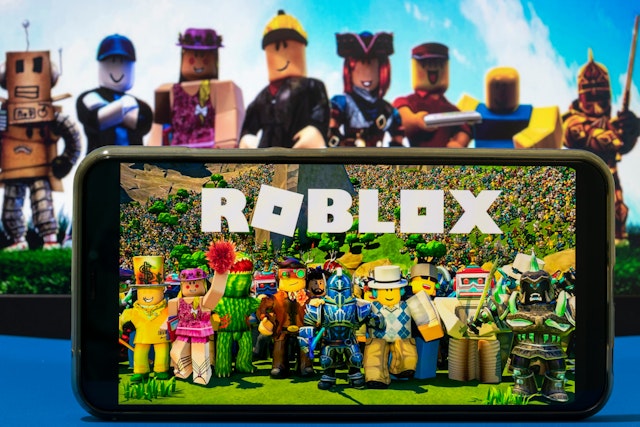This Week in the Metaverse: Kim Kardashian’s ‘new sex tape’ ad on Roblox & non-fungible testicles
Things are moving fast in the metaverse, and in the wider world of web3 as a whole. Depending on who you ask, this futuristic, blockchain-based space is either the next big thing for marketing – and for almost everything else – or an overhyped fad. Here’s what you need to know from this past week:
Kim Kardashian threatens ‘to burn [Roblox] to the fucking ground’

Kim Kardashian threatened to sue Roblox after it was revealed that a game hosted on the platform was advertising ‘Kim’s new sex tape.’ Kardashian was first made aware of the alleged tape when her six-year-old son, Saint, encountered the digital ad on Roblox, which also included a picture of the socialite crying. The aftermath of the incident was captured on a recent episode of The Kardashians, in which Kardashian calls Saint’s dad, Kanye West, and tearfully recounts the incident.
Roblox says that is has banned the developer behind the game, and the platform has emphasized its commitment to content moderation and “zero tolerance for sexual content of any kind.” This isn’t the first time that Roblox, which launched back in the mid-2000s as a video game for young kids, has found itself in an onerous spotlight, facing allegations of allowing sexual misconduct on its platform. It’s had a recurring problem with virtual sex parties, colloquially known as ‘condos,’ for example.
The recurring controversies on Roblox underscore a deeper issue facing the metaverse as a whole: how do you effectively police a virtual space that’s not subject to any single authority or jurisdiction? All we can say is that ‘metaverse lawyer’ could very soon start being a common (and high-paying) job title.
The Sandbox aims for $4bn valuation with new funding round

The Sandbox – a video game that has become one of the most popular zones for virtual development in the metaverse – will reportedly aim to raise $400m during its next round of funding in order to achieve a valuation of more than $4bn. The company plans to work with “both new and existing investors,” according to a report from Bloomberg, which received the leaked information from sources who asked to remain anonymous.
Born as a mobile game in 2012, The Sandbox entered the web3 space in 2018 when it introduced an in-game NFT marketplace. Since then, it’s grown to be one of the few platforms – along with the likes of Decentraland and Roblox – that many people, even those who are not deeply enmeshed in the world of web3, automatically associate with the metaverse. Many big-name brands and celebrities – among them Gucci, Paris Hilton and Snoop Dogg – have either purchased real estate or hosted events in the platform.
VR platform could enable your avatar to live forever

Somnium Space, a virtual reality (VR) world that’s already fully accessible via Oculus Quest headsets, is developing a feature for its platform called ‘Live Forever,’ which will aim to realize a vision that’s occupied the minds of sci-fi dreamers for generations: building convincing virtual renderings of real human beings that can live eternally in a virtual world, where us mere mortals can stop by and say hello.
For all of you who are shifting uncomfortably in your seat thinking about some of the darker episodes of Black Mirror, don’t worry – it doesn’t sound like the brainiacs at Somnium Space are cooking up plans to download human consciousness and re-upload it in a computer. We’re a long way off from that. Rather, the company is aiming to use artificial intelligence (AI) to mimic virtual avatars that have been carefully designed to look and act like real people.
The idea to launch ‘Live Forever’ mode occurred to Somnium Space’s founder and chief executive Artur Sychov after he found out that his father had been diagnosed with terminal cancer, according to Vice. “In those moments, he started to wonder if there was some way in which his children might be able to have a conversation with their grandfather, even after he was gone,” Vice reports.
The key to creating immortal digital renderings of ourselves and our loved ones? Vast quantities of data. Not just the typical kind of psychometric data that we all give out every time we like an Instagram post, but much more sensitive – much more personal – biometric data, such as cardiac activity and body movement, aggregated by new technologies that are already very much in the works. After collecting all of this data, which would apparently only be gathered from those users who opt-in to pay for ‘Live Forever’ mode, the company plans to let AI do its thing by taking over the virtual avatar, interacting with us sentients and then gradually modifying itself to become increasingly sophisticated and humanlike. (What could possibly go wrong..?)
Fidelity Investments hopes to woo younger consumers with new Decentraland activation

Financial management company Fidelity Investments has opened a virtual property in the metaverse, with its sights set on attracting younger consumers by offering a course on financial education. And also a virtual dance floor.
The ‘Fidelity Stack’ – as the property in Decentraland is known – is a virtual eight-story building, which in addition to the dance floor will include a “rooftop sky garden.” The building looks less like your typical office building and more like a Gaudi masterpiece, or maybe a Dali painting.
The new activation from Fidelity is an illustrative example of how the metaverse is being leveraged by brands to engage with younger audiences while simultaneously promoting a product or service – as well as promoting themselves as hip and tech-savvy. It’s possible that the company had an eye on the enormous popularity of dancing content on TikTok when it decided to build a virtual dance floor. There will also be a gamified element, as is common within the metaverse (which, after all, was born largely out of video games) – visitors to the Fidelity Stack, according to the company, will be challenged to collect ‘orbs’ as they move through the building and learn some of the basics about exchange-traded fund (ETF) investing.
“Fidelity is constantly innovating as we re-imagine what it looks like to engage with customers as a trusted financial services company in the future,” Kathryn Condon, Fidelity’s head of marketing channels and emerging platforms at Fidelity, said in a statement. “As web3 takes shape, Fidelity is excited to bring our expertise in financial education to this new virtual space.”
Men’s health charity Movember unveils ‘non-fungible testicles’
Movember, which describes itself as “the leading charity changing the face of men’s health,” has announced a new NFT series called “non-fungible testicles.” This aims to promote awareness of the risk of testicular cancer by giving token holders a gentle reminder to check themselves regularly.
The NFT series, designed in collaboration with Mishka NYC (an art collective) and MRM agency, will feature simple artwork – just two cartoonish anthropomorphized spheres – that will gradually evolve and change the more you check on them. This act of loving attention, the brand hopes, should remind token holders to also check themselves for any unusual changes. The less frequently you check in on your NFT, the more of its individual traits it will lose.
“Non-fungible testicles is a fun way to remind people of a very simple action to avoid or identify a possibility of testicular cancer,” Harsh Kapadia, Chief creative officer at MRM New York, said in a statement. “The gamification also reminds us the more often we check in, the healthier our non-fungible testicles get while making the pair more valuable.” Proceeds from NFT campaign – which will drop on April 26 – will go towards the TIGER trial, “a very large multinational clinical trial investigating which of the two current and commonly used treatments is more effective in preventing death in men who show a relapse of testicular cancer,” according to Movember’s website.
For more, sign up for The Drum’s Inside the Metaverse weekly newsletter here.

